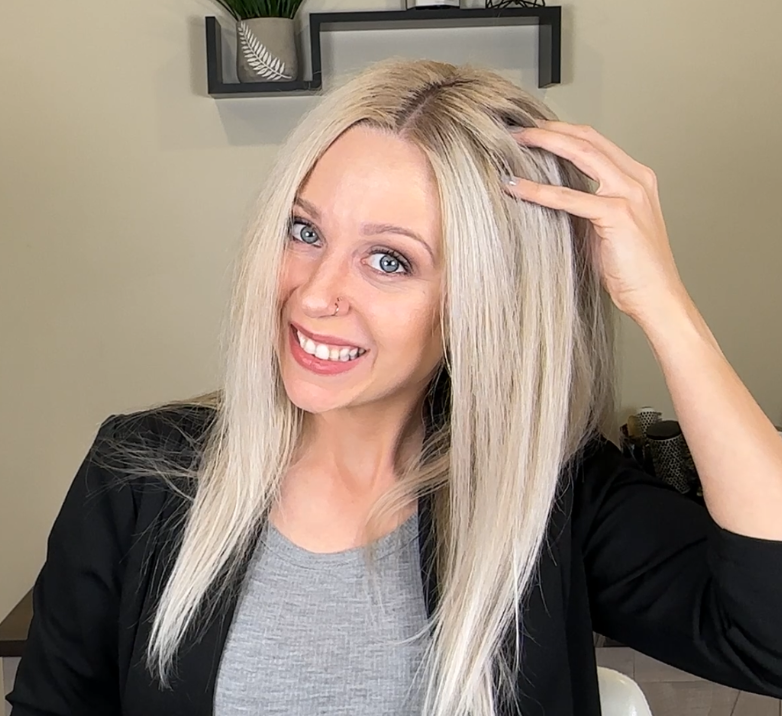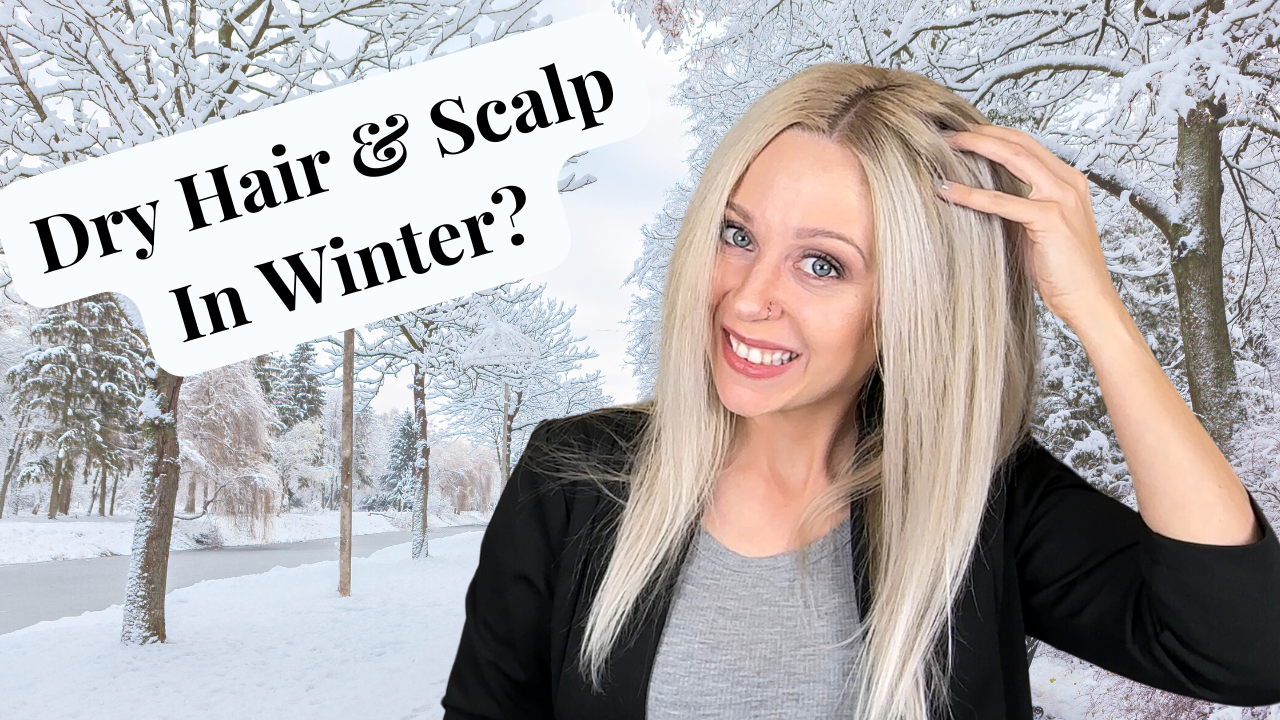
Is It Dandruff Or Dry Scalp? How To Stop The Itchy Flakes!
Having dandruff or a dry scalp is such a frustrating problem. You’re scratching your head, flaking, and embarrassed by it. You may have tried several different treatments, but none of them seem to be working. But the first step to finding the solution is actually determining if you have dandruff OR dry scalp before you begin any treatment, because they are two separate problems. So in this post, I’m going to cover the differences between dandruff and dry scalp, how to determine which one you have, as well as provide you with the proper treatments for your condition.
As a hairstylist, one of the biggest issues I see with a flaky scalp is clients treating the wrong problem, which will actually make the symptoms WORSE, not better. So determining which one you have is key here.
What is the difference between dandruff and dry scalp?
Believe it or not, dandruff and dry scalp are NOT the same condition. Both are fairly common, and they are actually completely opposite of each other and require opposite treatments. So it’s important to know which condition you have so that you can treat it properly.
So let’s start by learning about each condition and its symptoms to determine what treatment options will work for you.
What is/causes dandruff?
Dandruff (seborrheic dermatitis) is a medical condition on the scalp where a fungus is present that causes itchiness and sensitive skin.
The skin can become red and inflamed on the affected area with possible scaly patches depending on how severe it is. The flakes that are caused by dandruff will have more of a yellowish tint and are moist compared to the smaller, bright white flakes from dry scalp.
Dandruff happens when there is too much moisture present on the scalp, not the opposite. When there is excess moisture, this is a breeding ground for fungus to grow.
Because of this, dandruff is more prevalent in the summertime or humid climates where you sweat more frequently, or if you have oily skin.
Dandruff treatments will dry out the scalp and kill the fungus. So if you begin to treat dry scalp with dandruff treatments, you’ll likely make things worse.
If you can feel moisture on your scalp in the areas where you feel irritation, then you likely have dandruff.
What is/causes dry scalp?

Dry scalp is simply that–when your scalp is too dry, it thirsts for moisture and hydration.
The symptoms are an itchy scalp with lots of small white flakes that may fall onto your shirt. The flakes are not as soft as those of dandruff. This is not technically considered a medical condition; it is merely dry skin.
There can be a number of reasons why you may have a dry scalp. Medications, dehydration, hormones, genetics, or simply not using the correct products.
Dry scalp is more prevalent in the wintertime when the humidity is low and you aren’t sweating as frequently, or if you naturally have dry skin.
Remember that your scalp is skin, and it needs to be moisturized just as the rest of your skin does. Especially if you are already prone to having dry skin.
If you seem to only have dry scalp in the wintertime, see my post here.
Best dandruff and dry scalp treatments
***Since I’m sharing the products that I love to use with you guys, my posts may include affiliate links to these products. If you take action and purchase a product through clicking one of my links, I’ll make some commission money from it at no extra cost to you. This enables me to be able to continue giving you awesome hair tips, so thanks! ***
How to treat dandruff
Since dandruff is a fungal condition, it requires a medicated treatment depending on the severity. The product will contain an antifungal ingredient that will kill any fungus present.
If your condition isn’t very severe, then you can probably get by with an over-the-counter treatment. But if it is still persistent with the over-the-counter treatments, then you may need to get a prescription from your doctor.
But the first thing you should try is to shampoo your hair more frequently if you are skipping a lot of days between washes. While shampoo can dry out the hair and scalp, if you are getting dandruff, then drying out your scalp is exactly what you need to do.
Over-the-counter dandruff treatments
If washing more frequently doesn’t solve your problem, try over-the-counter topicals that have antifungal compounds.
There are many shampoos on the market made to treat dandruff (Head And Shoulders, Selsun Blue), but this can be tough for women because a lot of these shampoos are usually not color safe.
The professional quality brands will often make color-safe dandruff shampoos, so if you have color-treated hair, those are a better choice than the drugstore brands. I like Biotop’s Eco Dandruff Treatment because it contains a dandruff shampoo and a leave-in scalp treatment.
I have also found Scalpicin to help with the itchiness associated with dandruff (though it won’t reduce dandruff), and this is one product that works with both dandruff and dry scalp. Scalpicin is a hydrocortisone liquid that can be applied directly to your scalp and doesn’t need to be rinsed off.
Prescription dandruff treatments
If your condition is severe or still persists with over-the-counter treatments, then it may be time to see your dermatologist.
Yes, dermatologist, because your scalp is skin!
Your doctor can prescribe you medicated products that are much stronger than what you will get over the counter.
They’ll probably first offer you medicated shampoos, which likely won’t be color safe. And you may also not like how the shampoos make your hair smell or feel. They usually smell like sulfur.
So if you have colored hair, ask them about a medicated mousse instead. I’ve been given samples of these from my dermatologist. You’ll apply it to your scalp after the shower every time you wash your hair.
And if this still is not helping, your doctor can prescribe you an oral antifungal medication to treat the problem from the inside out. This is generally only for very severe cases.
How to treat dry scalp
Luckily, dry scalp can be treated fairly easily from home. You’ll first want to try washing your hair less often. And for most men, simply using conditioner generally solves the problem. Those 16-in-1 shampoo and engine cleaners usually don’t condition the hair and scalp very well.
You can try letting your conditioner sit on your scalp for a few minutes every time you wash. And it may be beneficial to try a scalp exfoliator to remove any dead skin cells, and then follow up with a mask.
My favorite system for treating dry scalp is with Paul Mitchell Hair And Scalp Mask and Tea Tree Shampoo And Conditioner. You can also get them all together as a kit here. This product smells and feels AH-MAZING on your scalp if it’s irritated.
Another great product for dry scalp is Amika’s Pink Charcoal Cleansing Oil. It exfoliates the scalp while adding hydration. Before you shower, apply this directly to your scalp and rub in with your fingers. Let it sit for 5 minutes and shampoo it out. I couldn’t have lived without this stuff while I was on Accutane.
It is also important to make sure that when you are brushing your hair, you brush your scalp as well! This stimulates your scalp as well as removes the dead skin cells.
I recommend using a 100% boar bristle brush for this, and I go more in-depth on how to brush your scalp in this post.
Conclusion
Living with dandruff or dry scalp can be extremely irritating, not to mention embarrassing. But to properly find a solution to the problem, you first need to determine which condition you have.
Dandruff is characterized by large and moist flakes on the scalp. The flakes may have a yellowish appearance and are accompanied by redness and moisture on the irritated area.
This is caused by a fungus that becomes present when there is extra moisture on the scalp. This is normally due to sweat, humidity, and not washing the hair enough.
To treat dandruff, you’ll need to use a medicated product to combat the fungus. You can first try over-the-counter products, but if they fail to work, then a trip to the dermatologist may be in order. They can give you prescription products, and if the case is severe enough, an oral antifungal medication.
Dry scalp is characterized by small, hard, white flakes on the scalp. While both conditions are itchy, dry scalp is present due to a lack of moisture and hydration on the scalp.
This condition is usually caused by washing the hair too frequently, not using conditioner, or using low-quality products. But since this is just dry skin, there may be a number of factors contributing to why your skin is dry, such as medication or hormones.
Over-the-counter products and changing your routine usually solves this issue easily.
Hopefully, now you’ve learned which condition you have, so that you can tackle those flakes and stop the itching!
If you have any further questions for me on this topic, be sure to leave them in the comments. And as always, Have A Good Hair Day!



Comments